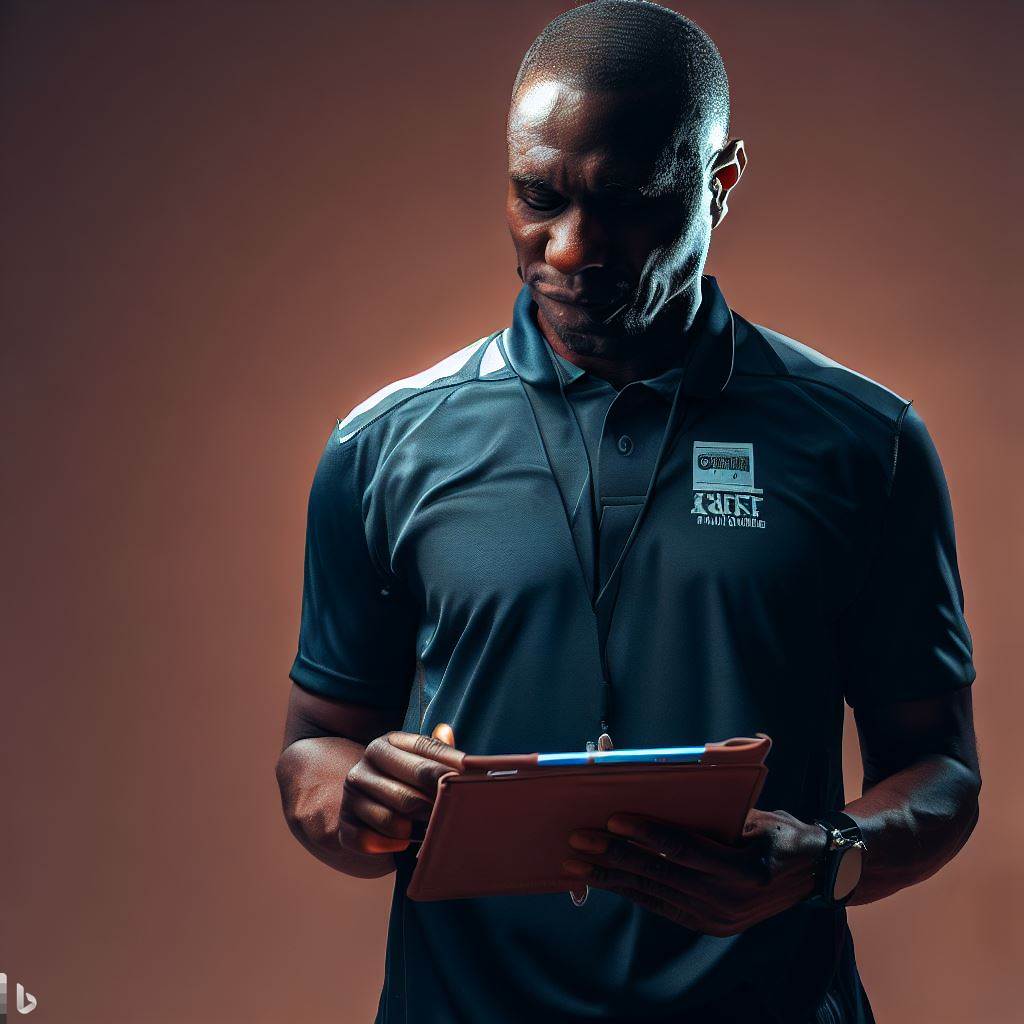Introduction
In any profession, career advancement is crucial for personal growth and professional success.
As an Athletic Director in Nigeria, it is essential to focus on advancing your career.
Advancing your career as an Athletic Director in Nigeria involves various aspects.
You need to constantly improve your skills, stay updated with industry trends, and network with professionals in the field.
One important aspect of career advancement is pursuing higher education and acquiring relevant certifications.
This can enhance your knowledge and skills, making you more competitive in the job market.
Additionally, attending workshops, seminars, and conferences can provide valuable insights and help you stay abreast of the latest developments in sports management.
Networking is another key factor in career advancement.
Building strong connections with colleagues, coaches, and influential individuals in the industry can open doors to new opportunities and help you climb the career ladder.
Furthermore, seeking mentorship from experienced Athletic Directors can provide guidance and support in navigating the challenges and complexities of the role.
It is also important to continuously assess your career goals and develop a plan to achieve them.
Setting short-term and long-term objectives can give you a clear direction and motivate you to strive for excellence.
In essence, career advancement is essential for success as an Athletic Director in Nigeria.
By continuously improving your skills, staying up to date with industry trends, networking, and setting goals, you can advance your career and contribute significantly to the field.
Understanding the role of an Athletic Director
Being an athletic director in Nigeria comes with immense responsibilities and duties that are crucial for the success of sports programs in educational institutions.
Responsibilities and duties of an Athletic Director in Nigeria
- Developing and implementing athletic policies and procedures to ensure fair and equal opportunities for all students.
- Overseeing the scheduling of athletic events, practices, and facilities, ensuring proper coordination and management.
- Managing budgets and fundraising activities to provide financial support for athletic programs.
- Ensuring compliance with rules and regulations set by relevant sports governing bodies.
- Recruiting, hiring, and providing professional development opportunities for coaches and athletic staff.
- Collaborating with other schools and institutions to organize competitions and leagues.
- Providing guidance and support to student-athletes in balancing their academic and athletic commitments.
- Monitoring student-athletes’ academic progress and addressing any issues or concerns.
- Acting as a liaison between the athletic department, school administration, and parents.
Skills and qualifications required for the role
To excel as an athletic director in Nigeria, certain skills and qualifications are essential:
- Strong leadership skills to effectively manage coaches, staff, and student-athletes.
- Excellent communication and interpersonal skills for effective collaboration and relationship-building.
- Knowledge of sports rules, regulations, and procedures to ensure compliance.
- Organizational and time management skills to coordinate multiple athletic events and activities.
- Budgeting and financial management skills to handle financial resources efficiently.
- Problem-solving and decision-making abilities to address challenges and make strategic choices.
- Experience in sports administration or coaching as a foundation for understanding the field.
- A passion for sports and a commitment to the holistic development of student-athletes.
Importance of effective leadership and management
Effective leadership and management are crucial for the success and growth of athletic programs in Nigeria.
An athletic director with strong leadership skills can inspire and motivate coaches, staff, and student-athletes to strive for excellence and achieve their full potential.
Good management ensures that resources, both financial and human, are allocated efficiently, facilities are well-maintained, and schedules are organized to optimize performance and opportunities.
Additionally, effective leadership and management create a positive and supportive environment that fosters teamwork, discipline, and character development among student-athletes.
By providing guidance, mentorship, and appropriate policies, athletic directors contribute to the overall success and well-being of student-athletes in Nigeria.
Basically, understanding the role of an athletic director in Nigeria requires an appreciation of their responsibilities, requisite skills, and the importance of effective leadership and management in fostering successful athletic programs.
Read: Qualifications Needed for Athletic Directors in Nigeria
Evaluating your current skills and qualifications
As an Athletic Director in Nigeria, it is important to regularly assess your strengths and weaknesses.
This will help you understand your current position and identify areas for improvement.
Assessing your strengths and weaknesses as an Athletic Director
To evaluate your skills and qualifications as an Athletic Director, you need to honestly assess your strengths and weaknesses.
This will give you a clear picture of where you stand professionally.
- Identify your strengths: Consider the skills and qualities that make you a successful Athletic Director. Are you a good leader, communicator, or problem solver? Assess your knowledge of sports management and your ability to handle responsibilities efficiently.
- Identify your weaknesses: Be critical of yourself and identify areas where you need improvement. Do you struggle with time management, decision-making, or conflict resolution? Recognizing these weaknesses is the first step towards growth and development.
Identifying areas for improvement and skill development
Once you have identified your weaknesses, it is important to determine the areas where you need improvement.
This will guide you in developing new skills and enhancing your existing ones.
- Prioritize areas for improvement: Focus on areas that are directly related to your role as an Athletic Director. For example, if you struggle with budget management, prioritize learning financial planning and budgeting.
- Set specific goals: Define clear and achievable goals that will help you enhance your skills. Set deadlines and create action plans to ensure you stay on track.
- Gain new knowledge and experiences: Take advantage of training programs, workshops, and conferences that can provide you with relevant knowledge and skills. Network with professionals in the field to gain insights and learn from their experiences.
- Seek professional development opportunities: Look for opportunities to gain practical experience and further develop your skills. Consider volunteering, taking on leadership roles, or pursuing advanced degrees or certifications.
Seeking feedback from colleagues, peers, and mentors
Feedback from others can offer valuable insights and help you identify blind spots or areas for improvement that you may not have recognized on your own.
Seek feedback from colleagues, peers, and mentors who can provide you with different perspectives.
- Engage in open and honest conversations: Request feedback from individuals you trust and respect. Encourage them to provide constructive criticism and suggestions for improvement.
- Consider anonymous surveys: To obtain honest feedback, consider conducting anonymous surveys among your colleagues and peers. This will ensure they feel comfortable sharing their opinions without fear of repercussions.
- Reflect on feedback and take action: Once you receive feedback, take the time to analyze it and identify patterns or areas that require attention. Develop an action plan to address the feedback and make necessary improvements.
Evaluating your current skills and qualifications as an Athletic Director is crucial for your professional growth.
By honestly assessing your strengths and weaknesses, identifying areas for improvement, and seeking feedback from others, you can continuously enhance your abilities and advance your career in Nigeria.
Read: Networking for Athletic Directors: Opportunities in Nigeria
Setting career goals and objectives
Setting clear career goals and objectives is crucial for anyone aspiring to advance their career as an Athletic Director in Nigeria.
By defining short-term and long-term goals, establishing milestones, and incorporating personal and professional aspirations into a career plan, individuals can pave the way for success in this competitive field.
1. Defining your short-term and long-term career goals
- Short-term goals should be achievable within a specific timeframe, such as one to three years.
- Examples of short-term goals for athletic directors may include obtaining additional certifications or completing leadership training programs.
- Long-term goals provide a broader vision for the future and may take five or more years to accomplish.
- Long-term goals for athletic directors may involve reaching a higher leadership position within an established sports organization or starting their own sports academy.
2. Establishing milestones and timelines to achieve those goals
- Milestones are important markers of progress towards achieving career goals.
- By breaking down goals into smaller milestones, athletic directors can track their advancement and make necessary adjustments.
- Setting specific timelines for each milestone ensures accountability and keeps individuals focused on their goals.
- For example, an athletic director may set a milestone to increase sports participation in schools by 20% within two years.
3. Incorporating personal and professional aspirations into your career plan
- A career plan should align with both personal and professional aspirations to ensure fulfillment and satisfaction.
- Consider the values, interests, and passions that drive you as an individual.
- Aligning your career goals with your personal aspirations will fuel your motivation and drive for success.
- For example, if you are passionate about promoting youth sports development, include initiatives focused on grassroots programs in your career plan.
By setting clear goals, establishing milestones, and aligning personal and professional aspirations, aspiring athletic directors in Nigeria can build a solid foundation for their career advancement.
Having a well-defined plan not only provides direction, but also serves as a roadmap to measure progress and make necessary adjustments along the way.
Remember, a successful career in sports requires dedication, perseverance, and the ability to adapt to changing circumstances.
With careful planning and a proactive mindset, you can thrive as an athletic director in Nigeria.
Read: Strength Coaching: A Women’s Perspective in Nigeria

Developing a professional network
Developing a professional network is crucial for advancing your career as an Athletic Director in Nigeria.
Networking provides numerous opportunities for growth and can open doors to new possibilities and connections.
Here are some key points to consider:
Importance of Networking for Career Growth
- Networking allows you to connect with like-minded professionals in the sports industry.
- Building relationships with others in your field can lead to potential job opportunities.
- Expanding your network increases your visibility and enhances your professional reputation.
- Through networking, you can gain valuable insights, information, and advice from experienced individuals.
- Collaborating with others can result in new partnerships, collaborations, and innovative ideas.
Attending Industry Events, Conferences, and Seminars
- Participating in relevant events allows you to meet industry experts, potential mentors, and employers.
- Attending conferences and seminars exposes you to new trends, technologies, and best practices in the sports industry.
- Being present at industry events demonstrates your commitment to professional development.
- Engaging in networking activities during these events can help you establish meaningful connections.
- Sharing your own expertise and knowledge through presentations and discussions can boost your credibility.
Joining Professional Associations and Organizations in the Sports Industry
- Being part of relevant associations provides access to a network of professionals with shared interests and goals.
- Membership in associations demonstrates your commitment to your field and continuous learning.
- These organizations often provide resources, training programs, and opportunities for professional growth.
- Engaging in committee work or volunteering within these associations can expand your network further.
- Networking through professional organizations can lead to mentorship, sponsorships, and career advancement opportunities.
Overall, developing a professional network is essential for career advancement as an Athletic Director in Nigeria.
Networking enables you to expand your connections, gain knowledge, and access new opportunities.
Remember, building relationships and actively engaging with others in the industry can significantly contribute to your success.
Read: Training Tools: Nigerian Strength Coach Guide
Continuous learning and professional development
In order to advance your career as an Athletic Director in Nigeria, continuous learning and professional development are essential.
One way to achieve this is by pursuing relevant certifications and training programs.
- These certifications and programs can provide you with valuable knowledge and skills that are specific to your role as an Athletic Director.
- They can also enhance your credibility and demonstrate your commitment to professional growth.
Additionally, staying updated with industry trends and best practices is crucial for your career advancement.
- Being aware of the latest developments in the field can help you adapt to changes and make informed decisions.
- It can also position you as an expert in your field, which can open up new opportunities for career progression.
Furthermore, seeking opportunities for mentorship and coaching can greatly contribute to your professional development.
- Having a mentor who is an experienced Athletic Director can provide you with valuable guidance and advice.
- They can share their insights and help you navigate through challenges and make strategic career choices.
Mentorship can also help you build a strong professional network, which is crucial in the sports industry.
Additionally, coaching can help you identify your strengths and weaknesses and work on areas that need improvement.
- A coach can provide you with constructive feedback and help you set goals that align with your career aspirations.
- They can also support you in developing the necessary skills and competencies to excel in your role.
Generally, advancing your career as an Athletic Director in Nigeria requires continuous learning and professional development.
- By pursuing relevant certifications and training programs, staying updated with industry trends, and seeking mentorship and coaching, you can enhance your skills and knowledge.
- These efforts will not only contribute to your personal growth but also open up new opportunities for career advancement.
Embracing technology and innovation
Athletic directors in Nigeria can optimize athlete development and sports management by embracing technology.
Technology streamlines processes, enhances communication, and facilitates data-driven decisions. Manual tasks are now simplified.
For instance, online registration systems ease athlete sign-ups, reducing administrative burdens.
Communication is vital, and technology offers tools like email and social media for quick and efficient contact with athletes, coaches, parents, and stakeholders.
Online platforms promote transparency and information sharing.
Moreover, technology introduces innovative training techniques, like virtual reality and wearables, for real-time feedback and skill optimization.
Performance analysis software aids in monitoring athlete progress.
In Nigeria, technology helps overcome resource limitations. Online training programs reach remote athletes, promoting talent development equality.
Additionally, it improves talent identification and recruitment, fostering inclusivity and diversity.
Embracing technology is essential for advancing as an athletic director in Nigeria.
It enables efficient communication, streamlined processes, and data-driven decision-making, ultimately enhancing athlete development and sports management for a more successful sports industry.
Building a strong personal brand
Building a robust personal brand is vital for advancing as an Athletic Director in Nigeria.
In this digital age, cultivating a positive online presence is essential, and social media platforms play a crucial role.
You must consistently post relevant content on LinkedIn, Twitter, and Facebook, showcasing your expertise and achievements.
Create a professional image by sharing informative articles, industry insights, and success stories.
Avoid posting negative or controversial content. Focus on providing value and establishing yourself as a reputable professional in athletics.
Engage with others by commenting, joining groups, and participating in discussions to build a strong network.
Craft an impressive resume and cover letter, highlighting qualifications, experiences, and achievements relevant to the Athletic Director role. Ensure a well-formatted, error-free, and readable resume with quantifiable results and a professional photo.
Customize each cover letter, emphasizing how your skills align with the job requirements.
Use a professional tone and concise language to convey enthusiasm and suitability.
Create an online portfolio or website displaying work samples, accomplishments, and testimonials.
This portfolio visually represents your expertise.
Building a strong personal brand demands consistent effort, engagement, and authenticity.
Maintain professionalism in online interactions to enhance career prospects as an Athletic Director in Nigeria.
Finding career advancement opportunities in Nigeria
Advancing your career as an Athletic Director in Nigeria requires a proactive approach and strategic planning.
Here are some effective strategies to explore:
1. Exploring job openings and vacancies in athletics departments
- Regularly check job boards, online platforms, and professional athletic associations for available positions.
- Follow athletic departments and organizations on social media to stay updated with their job postings.
- Attend job fairs and recruitment events specifically targeted towards the sports industry.
2. Networking with colleagues and industry professionals for referrals
- Build strong relationships with other Athletic Directors, coaches, and professionals in the sports industry.
- Attend conferences, seminars, and workshops to connect with like-minded individuals.
- Engage in discussions on online forums and platforms related to athletics in Nigeria.
- Seek mentorship opportunities from experienced Athletic Directors who can guide your career path.
3. Leveraging personal connections and relationships for career growth
- Tap into your existing network of friends, family, and former colleagues who may have connections in the sports industry.
- Inform them about your career aspirations and seek their advice or assistance in identifying opportunities.
- Participate in community events, fundraisers, and sports activities to expand your network of potential contacts.
Remember, finding career advancement opportunities is not only about searching for job openings but also about creating meaningful connections and leveraging your existing network.
By actively exploring job openings, networking with industry professionals, and leveraging personal connections, you increase your chances of finding career advancement opportunities as an Athletic Director in Nigeria.
It is also important to continuously enhance your skills and knowledge through professional development programs, certifications, and training.
Stay up-to-date with industry trends and best practices to position yourself as a competitive candidate for career advancement.
Lastly, maintain a positive and proactive attitude throughout your career journey.
The sports industry can be competitive, but with determination, perseverance, and strategic planning, you can successfully advance your career as an Athletic Director in Nigeria.
Stay motivated, stay connected, and never miss an opportunity to grow both personally and professionally!
Overcoming Challenges and Staying Motivated
As an athletic director in Nigeria, you are likely to face various challenges throughout your career.
However, with the right strategies and a positive mindset, you can overcome these obstacles and stay motivated on your path to success.
Identifying Common Challenges Faced by Athletic Directors in Nigeria
- Limited funding and resources for sports programs can be a significant challenge.
- Poor infrastructure and lack of proper sports facilities may hinder the development of athletes.
- Inadequate training opportunities and lack of professional development programs.
- Bureaucracy and red tape within the sports administration system can slow down progress.
- Difficulties in managing and motivating coaches, athletes, and support staff.
Developing Strategies to Overcome Obstacles and Setbacks
- Seek external funding and partnerships to supplement limited resources.
- Advocate for better sports infrastructure and facilities in collaboration with relevant stakeholders.
- Continually seek opportunities for training and professional development to improve your skills.
- Build relationships and network within the sports administration system to navigate bureaucratic hurdles.
- Implement effective communication and leadership strategies to manage and motivate your team.
Maintaining a Positive Mindset and Motivation Throughout Your Career Journey
- Set clear and achievable goals to stay focused and motivated.
- Celebrate small wins and achievements to maintain a sense of progress and satisfaction.
- Seek support and guidance from mentors or professional associations in the field.
- Stay updated with industry trends and innovations to stay ahead of the game.
- Take care of your physical and mental well-being through regular exercise and self-care practices.
Remember, the journey to advancing your career as an athletic director in Nigeria may not always be smooth.
However, by identifying common challenges, developing effective strategies, and maintaining a positive mindset, you can overcome obstacles and stay motivated to achieve your goals.
Embrace the challenges as opportunities for growth and learning, and never lose sight of your passion for sports and guiding athletes toward success.
Delve into the Subject: Careers Behind the Scenes in Nigeria’s Sports Industry
Conclusion
To summarize, advancing your career as an Athletic Director in Nigeria requires dedication, perseverance, and continuous learning.
Throughout this article, we have discussed key points that can help you in this journey.
Firstly, gaining relevant education and certifications is crucial for career growth.
It is important to stay updated with the latest trends and developments in the field of sports management.
Networking is another vital aspect that can open doors to new opportunities.
Building connections with fellow professionals, coaches, and administrators can provide valuable insights and potential job offers.
Taking proactive steps towards gaining hands-on experience is essential.
Volunteering, interning, or working at lower levels of sports administration can help you acquire practical skills and enhance your reputation.
Furthermore, leadership qualities and effective communication skills play a significant role in excelling in this position.
Being able to inspire and motivate teams, handle conflicts, and make sound decisions are crucial for success.
To advance your career, it is important to constantly seek professional development opportunities.
Attending workshops, seminars, and conferences can help you stay up-to-date with industry advancements and expand your knowledge base.
In summary, aspire to conquer challenges and aim for growth.
With determination, hard work, and a proactive mindset, aspiring Athletic Directors in Nigeria can pave their way towards successful careers. Remember, success is a journey, not a destination.




